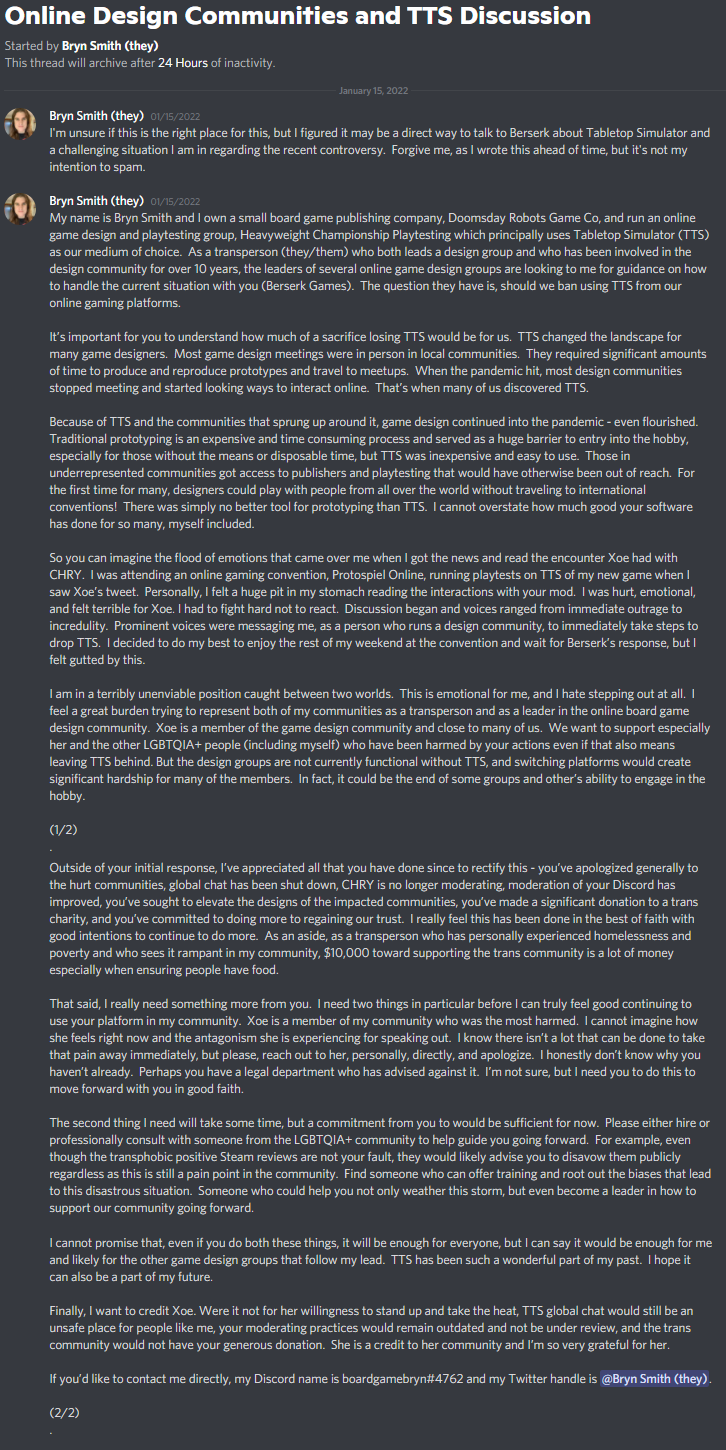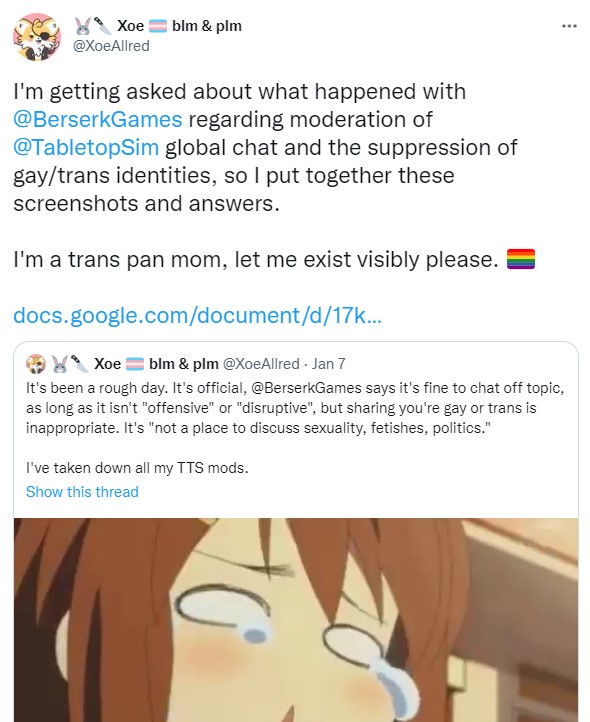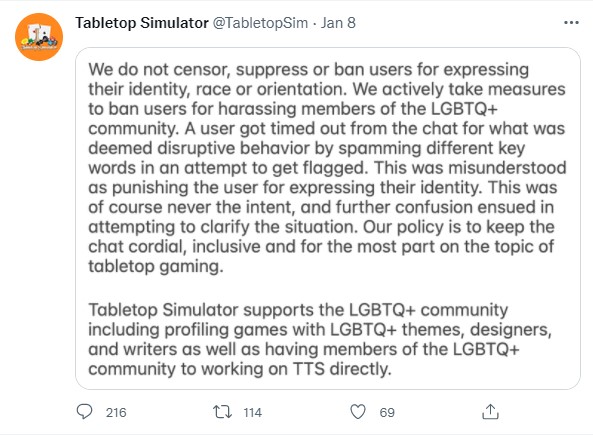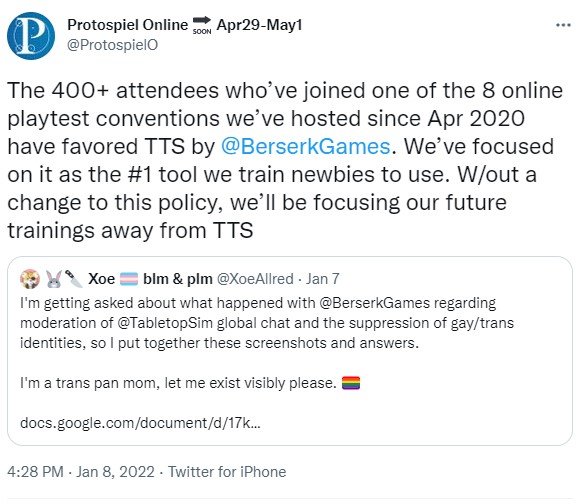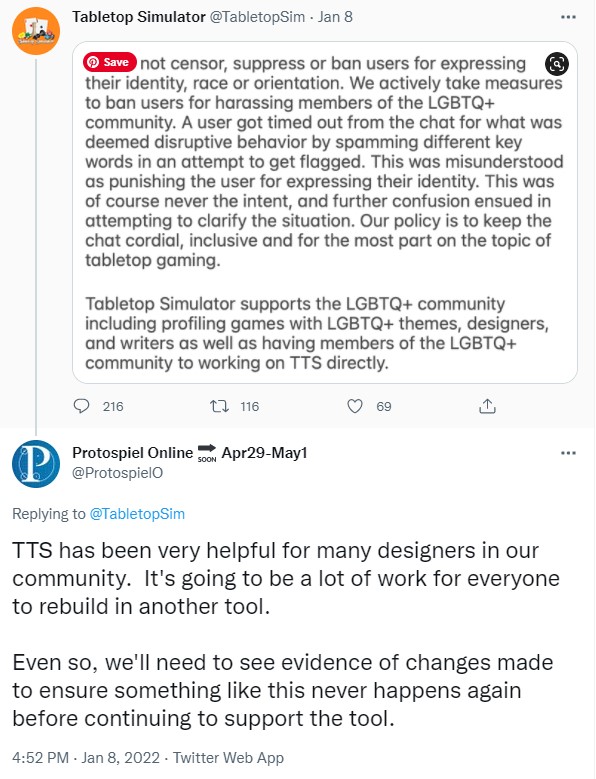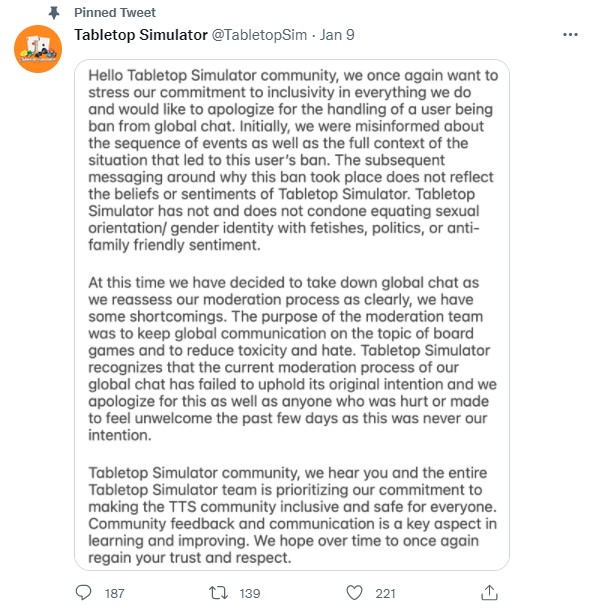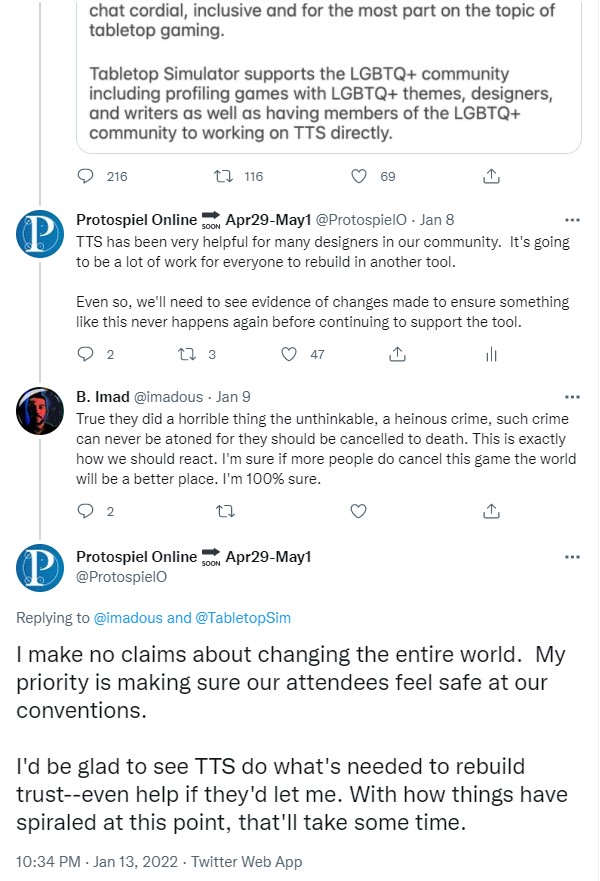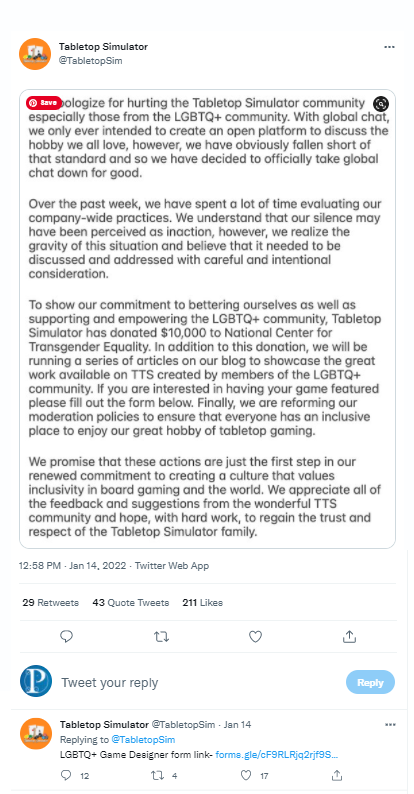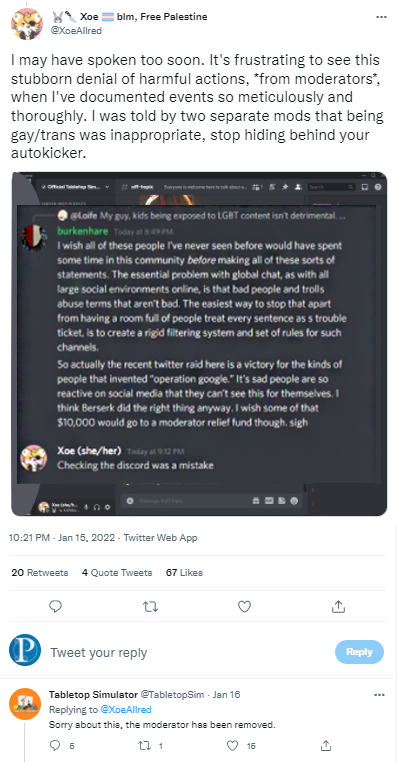Last Updated: March 1, 2024
As of February 16, 2022, Protospiel Online has discontinued support for the virtual board gaming platform Tabletop Simulator (TTS) developed by Berserk Games.
In the months after this change:
- We drastically ramped up our support both between and during our events for the virtual board game platforms Tabletop Playground (TTP), Screentop.gg, PlayingCards.io, and Tabletopia
- We built a Digital Prototypes Help page with a range of resources for alternate tools.
- We collaborated with TTP, Screentop.gg, PlayingCards.io, and Tabletopia to help them improve their platforms for the purposes of online playtesting.
- We partnered with creators in our community to run public training sessions for Tabletop Playground and Screentop.gg via Twitch livestreams and our YouTube channel
- In order to make our events more accessible to a wider variety of attendees, we encouraged attending designers to build each of their prototypes in at least one free-to-play platform where possible (see this FAQ entry for more info)
- We set up prototype listings on our website to allow designers to list multiple available digital platforms
- We added 4 new sections to our Code of Conduct under “Special Considerations for Virtual Playtesting“
- Playtester Availability Based on Platform
- Sharing Digital Players Wanted Cards
- No Unsolicited Direct Messages (DMs)
- Digital Prototype Access
Going forward:
- We will not provide training for TTS on our website or Discord server
- Our FAQ will not direct users to resources that help them use TTS
- We will provide unlock codes for TTP rather than TTS to our scholarship recipients
- Our Tech Requirements page will not mention TTS
- TTS will not be a selectable platform when adding a prototype listing to our website
- TTS will not be a selectable option when creating a Players Wanted card for posting in our Discord #looking-for-a-game text channel
- LFG Voice Moderators will not assist designers in verbally coordinating playtests for games using TTS

Why the change in policy?
This FAQ entry has the TL;DR. If you want the details, keep reading.
Protospiel Online runs on the Golden Rule that each designer (or team of designers) should aim to give as much playtesting time as they get from the community. Given this, the multiple people in our community who stopped feeling comfortable using TTS due to the actions of Berserk Games (see below) would not have been able to easily participate if TTS continued in the place it held from 2020 through 2021 as the platform 95%+ of playtests used.
While it is true that it is up to each designer to decide for themselves which digital board game platform(s) they will use to build their prototypes, it is also up to us as community leaders to maintain spaces that allow people to interact without unnecessary friction or discomfort.
We discussed the situation privately with multiple designers who became uncomfortable using TTS in early 2022. What we learned from those conversations was that, while these designers didn’t feel animosity toward people who run their playtests using TTS, they also didn’t want to have to repeatedly decline to playtest prototypes built on TTS, and they certainly didn’t want to have to repeatedly explain why they were declining. What’s more, they didn’t want to feel like a drain on the group if they were receiving plenty of time and feedback invested into their prototypes but were unable to find more than a handful of prototypes they could playtest for others.
We understood that the need to rebuild prototypes in a new platform would pose some level of inconvenience ranging from minor to major for designers who had already put a lot of time and effort into building their prototypes on TTS. This is why we committed to doing everything mentioned above to support our community in learning to play and build in the alternate platforms.
Strengthening our community with greater platform diversity
From our seat behind the customer service desk for Protospiel Online, we have seen that there are plenty of reasons the TTS tool itself is not the best solution for online playtesting. Rather than feeling discouraged about the absence of TTS at our events, our community used the opportunity to work together and get better acquainted with a variety of digital prototyping options.
The fact that TTS had accounted for 95%+ of the prototypes at our events prior to February 2022 had made it impossible for many people to participate up to that point. For example, there are some people who refuse to open a Steam account, which is required to access TTS. There are others who have long been disgusted with TTS’s lax policies on intellectual property rights and refuse to use the platform for this reason. There are also a significant number of potential attendees who have run-down or low-performance computers that can’t access and/or keep up with the processing demands TTS puts on them. Using less resource-intensive programs like Screetop.gg and PlayingCards.io makes all of the games in our community more accessible to people who can’t afford a new, high-performance laptop or desktop computer.
We have always been committed to making Protospiel Online a place where designers and playtesters of any background or experience level can come together to help make the games of the future the best they can be. We believe that increasing the diversity of digital board game platforms represented at our events has increased the diversity of designers and playtesters who can participate. We’re looking forward to continuing to grow the diversity of our games and community together.
The whole story
The remainder of this page is for those who don’t know the details of the situation that prompted us to reconsider and ultimately change our policy. It’s also for those who’ve felt bewildered, confused, frustrated, etc. by the change.
As an organization committed to creating safe online spaces for marginalized groups, this was not the first time and is unlikely to be the last time we’ll have to make a tough call like this one. We want all of our community members to know that we’ve listened to and considered several different perspectives while making this choice. We heard and understood the confusion, disappointment, and general sense of unease this shift caused for many people in our community. In the end, we chose what we felt was the best of two bad options available at the time.
For those feeling left in the cold by this policy change, even if the below doesn’t persuade you to continue engaging with Protospiel Online, we hope it will serve to help you unpack your own feelings and thoughts around events like these that, whether we like it or not, continue to regularly show up in all areas of our lives.
Why are people refusing to use TTS?
On January 7, 2022 Xoe Allred (Zoë ALL-red) of Knife Bunny Games published a Tweet sharing screenshots from its conversations with mods for the TTS global chat and Discord server and stating that it had removed all of its prototypes from TTS.
Xoe saved screenshots of a conversation with TTS/Berserk asking why it was banned from the in-game global chat after self-identifying as gay, then asking for clarification on how this went against TTS’s rule that chat content must “be family friendly and centered around Tabletop Simulator, tabletop games and chatting with other players.”

Xoe gathered and transcribed all the screenshots from various platforms where the conversation took place into this Google Doc. The Google Doc also includes Xoe’s commentary and its thought process in deciding to stop using TTS. The final straw for Xoe was a conversation inside the TTS Discord server in which it asked “Is gender considered inappropriate for chat too? Like sharing that I’m trans?” and CHRY, a mod with the role ‘Berserk’ inside their server, replied “Tabletop simulator is about playing tabletop games, not a place to discuss sexuality, fetishes, politics.” Xoe then asked “Are you suggesting that being trans is a fetish or political?” and received no direct response.
In the few days after Xoe’s initial Tweet, team members from TTS put out a series of Tweets attempting to make a public apology. While no one can ever have 100% certainty of what another person’s true motivations are, these attempts to make a public apology rang hollow to many in the LGBTQIA+ community and ended up further inflaming the situation. Some public statements that came out from the TTS/Berserk team contradicted themselves saying in the same post that they supported the LGBTQIA+ community while simultaneously implying that Xoe was either a liar or unable to understand things that should have been obvious.
While the first few public statements from the @TabletopSim account came out, CHRY continued to serve as a mod in the TTS Discord server, posting comments there insisting that everything was merely a misunderstanding. Given that Berserk was not intervening and CHRY continued to defend their original actions from a position of authority as a mod, the company’s actions were not backing up their statement that “[TTS] does not condone equating sexual orientation/ gender identity with fetishes, politics, or anti-family friendly sentiment.”
TTS’s third response post included the announcement of some concrete actions members of the LGBTQIA+ community inside the TTS Discord server had been asking for, including a $10,000 donation to the National Center for Transgender Equality. Unfortunately, the statement continued to ignore the human element. It still did not include the removal of CHRY from moderator duty or a personal apology to Xoe for both the original offense of not showing respect within their internal communication systems and for the aspects of their public statements that played a part in stirring up bullying behavior toward Xoe.
Shortly after this third public response, Bryn Smith, owner of Doomsday Robots Game Co and leader of the Heavyweight Championship Playtesting Discord server, reached out to Berserk Games through the TTS Discord server. She posted a message thread explaining what Berserk’s next steps would need to be if the company wanted to rebuild trust with the LGBTQIA+ community. (You can read the content of those posts here.) The on-shift moderator in the TTS Discord server told Bryn they would elevate the message directly to the Berserk team. Shortly after this, Berserk contacted Bryn privately to let her know their team had recently reached out privately to Xoe to extend a personal apology.

The final piece of advice Bryn offered was to “either hire or professionally consult with someone from the LGBTQIA+ community to help guide [Berserk] going forward.” The company also assured Bryn in their private message that they were “working directly with LGBTQIA+ members of their team, discussing at length what to do going forward.”
At the time of this writing, we’re not aware of any further public announcements from Berserk with steps they are taking to consult or contract with anyone specialized in cultural sensitivity or online community safety with regard to LGBTQIA+ issues.
Why haven’t TTS’s public apologies stopped the criticisms?
No one on our leadership team or anyone we’ve talked to privately has said they think anyone/everyone behind TTS is a cruel-hearted, irredeemable villain. Even publicly, Xoe states in her Google Doc that it doesn’t believe they have intent to harm LGBTQIA+ community members.
The problem is that Berserk has repeatedly demonstrated in their responses they don’t know how to handle these kinds of situations with their current set of resources, and, as far as we can tell right now, they haven’t accessed any new resources to help them learn how to better engage with LGBTQIA+ community members in the future. This creates the unsettling feeling that it would still be easy for something like this to happen again.
We’ve discussed this situation with many members of our community looking at this from different perspectives. It’s not uncommon for people to tell us privately that they don’t feel safe to voice their opinion that the lack of forgiveness for TTS from the LGBTQIA+ community bothers them. It feels scary and disappointing to think that people and companies can make mistakes so terrible that the Court of Public Opinion will demand their complete shunning. This idea feels especially scary for people who can’t quite get their heads around what was so very upsetting in the first place about TTS representatives’ words and actions.
The Human Element
One key point that many commentaries fail to address about all this is that Xoe was not some common everyday user of the TTS platform. As we enter the scene in early 2022, Xoe has been participating in online playtesting communities and using TTS to build all of its digital prototypes for at least a year. It has been encouraging people to buy copies of TTS so they can join its tables. Xoe has been helping several other people learn the controls for TTS and navigating others through assembling their own prototypes using TTS. It has essentially been working for TTS as their unpaid sales person and trainer — not because TTS ever asked Xoe to do this or, in fact, ever acknowledged it in any way up to this point. Xoe did all of this simply because it was required to participate in our online playtesting communities as they had been structured up to that point.
And, because it matters to us, we’ll also point out that Xoe has been a very positive contributor to many game designer communities, including Protospiel Online, throughout the time it had been using TTS as its digital playtesting platform. Xoe is a model attendee for our online conventions as far as participating in all activities, following all the guidelines and procedures, bringing fun, interesting games for everyone to try, and giving and receiving feedback in a kind, helpful, and respectful way. Based on our experiences with Xoe, we have no reason to believe it would try to stir up trouble for trouble’s sake.
In what we might call fairness to TTS, their practice of ignoring Xoe’s efforts to promote their platform is unlikely to have been due to any kind of deep-seated transphobia behind the scenes. They have been an equal-opportunity ignore-er across all types of people who have similarly been working to spread the word about TTS as a digital prototyping tool since early 2020.
Many community leaders have reached out to TTS in the past to seek ways to partner and gotten no response. We have posted their sales on social media. They don’t even give us a follow or a like. We send them an email. They never respond at all. We watch the training videos they’ve made for their own product. They’re out of date and difficult to follow. It falls to the designer community to make better videos, all along with no way to get a commission for doing things to drive traffic and sales for the product. We’ve heard reports that Berserk doesn’t respond to requests for payment from people who license their games or build mods for their downloadable content store and they don’t respond in a timely manner when publishers ask them to remove mods containing their intellectual property from the TTS Workshop.
No one we’ve talked to knows anyone who works at Berserk personally. Normally that wouldn’t be all that odd, but considering that the board game industry operates with such above average transparency, this faceless, nameless, unresponsive company gives a fairly unfriendly and untrustworthy impression.
But enough about TTS’s relationship to the board game community as a whole. Back to Xoe.
As a power-user and evangelist for a product that’s been an almost daily part of its life for at least a year, Xoe starts to notice posts in the global chat expressing gay/queer pride and decides to add a statement of its gay identity in solidarity. It is met with what seems to be an auto-ban.
Since all of its board game designer friends exclusively use TTS for playtesting, Xoe doesn’t want to have to stop using TTS because of one uncomfortable exchange. It emails the company using language that gives them the benefit of the doubt and even offers to help them with some free cultural sensitivity consulting. They ignore this for a week or more.
Eventually Xoe visits their Discord server seeking a mod who can explain the chat policies around what is considered “off-topic.” In response to its question on whether or not it is allowed to let people know that it is trans, the mod replies that the chat is “not a place to discuss sexuality, fetishes, politics,” and ignores Xoe’s request for clarification on whether this statement should be taken to mean they are labeling trans identities as a fetish or political.
This is all quite bad enough, but it’s still only the beginning. Next, they put out public apologies, some of which refer to Xoe (one of the people who’s been supporting the spread of their product for a year or more) as a nameless faceless “user,” and imply that it is lying and/or purposefully trying to stir up trouble. Finally, after about a week spent under the constant stress of being in the public eye, getting bombarded with messages from both supporters and bullies, and seeing a storm of insults towards it and unfounded accusations of lewd behavior on its part in the hundreds of “Positive Reviews” under TTS’s Steam listing, the leadership behind all the policies that set Xoe up for this horrible treatment send it a personal apology. Of course, this apology doesn’t come until after 50-100 people have told TTS in public forums that the way they are treating Xoe is out of line.
After all of this, it seems more than understandable that Xoe and many others who witnessed this unfolding would need some time away from TTS to heal and assess whether or not it feels safe to engage with the product again. And, for our part, if they ever do return to the platform, we’d want to know they are returning because they truly feel comfortable and not because using it is the only way to participate in communities they want to be a part of.
Tips and Resources for Continuing the Conversation
In the event that the human element described above has not gotten you to the point of understanding Xoe’s and its supporters’ perspectives, we’d like to offer you some resources that may help.
First, a very timely episode of the Stuff You Should Know Podcast came out shortly after these events entitled “How Forgiveness Works.” If you want to skip to the meatiest part, start at 19:30 min mark. This episode goes over the ways forgiveness can be both beneficial as well as harmful if not carried out in the appropriate way.
Next, this interview with psychologist Dolly Chugh from behavioralscientist.org, “Why Being Good-ish is Better than Being Good,” touches on a lot of points very applicable to this situation with TTS. If you learn better by listening rather than reading, you can listen to this 10 min video of our Lead Organizer, Heather Newton, reading the contents of the article.
Finally, if you are feeling afraid that asking questions or bringing up concerns will cause the online playtesting community to react to you similarly to how people reacted to TTS, know that you are not alone in this struggle. Multiple people expressed these thoughts in various forums in the weeks and months after these events. In an effort to help you navigate conversations from this position with better outcomes for people on both sides, here are some rules of thumb:
Good intentions don’t prevent harmful impacts
While it does not make someone a bad or unwelcome person if they have questions or concerns, there are appropriate and inappropriate approaches to asking these questions and engaging with others over these issues. Although everyone has a right to their opinion, they cannot reasonably expect access to express all opinions in all situations without consequence.
Public forums and mixed groups are not productive places to discuss sensitive topics
Even if statements such as “these people are being too sensitive,” “it seems to me a public apology should be enough,” “TTS and its employees are human beings who have also suffered in this situation,” “cancel culture/politics is ruining our society/hobby,” or simply “I don’t get what the big deal is” represent your true opinion, it is disrespectful and inconsiderate to express these things in a public space containing people who are in the midst of grieving over the issue you have questions about. This is especially true if comments such as these are among only a few of the comments you’ve ever contributed to the public space in question.
It is not an onlooker’s place to prescribe the timeline for a wronged party’s healing
When a third party who was not directly impacted by an abusive behavior says to the wronged party, “Can’t you just forgive them so we can all move on?” In the absence of meaningful work over time put in by the offender, this amounts to nothing more than a guilt trip for the wronged person. The third party is effectively saying, “The fact that you aren’t getting over this is causing problems for me. It would make my life easier if you could continue to engage with the offender, thereby denying your truth that you don’t trust them or feel safe interacting with them.”
Respectful requests to talk privately with a friend are a good option
If you have a friend who you believe better understands the perspective you would like to get a handle on, consider reaching out to ask if they would be willing to talk with you about it in private. If you do this, be sure to lead the request by telling them you respect their viewpoint and, if/when they have the bandwidth to talk with you about the topic in question, you feel a conversation with them would go a long way to helping you understand. Also make it clear that you know it may not be possible for them to find the bandwidth at all, and you won’t take it personally if they decline.
Engage with groups that have already given consent to doing free emotional labor
For those who can’t or don’t want to reach out to someone in their own circle of friends, consider joining the Free Emotional Labor Club Facebook Group. Their group description begins with “Many people have been shouted down by social justice radicals just for asking honest questions about social justice concepts, and we feel that this practice is counterproductive to building a movement. We believe that conversation and discussions are far more productive than making people pay for their ignorance. As such, this is a space where we welcome and encourage open and honest questions.” This group has a clear set of 8 rules everyone needs to agree to follow to keep the conversations safe and productive. Make sure to read and understand all the rules before beginning to interact in this group. (Thank you to Bryn Smith for making us aware of this resource.)
